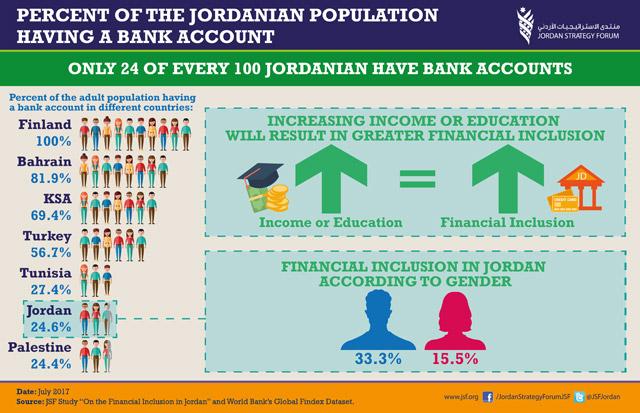You are here
Jordanians still suffer from low financial inclusion — study
By JT - Aug 08,2017 - Last updated at Aug 08,2017

AMMAN — Financial inclusion in Jordan is “relatively low”, with the rate of bank accounts amongst those 15 years old or older standing at 24.6 per cent and at 15.5 per cent for females, a recent study by The Jordan Strategy Forum (JSF) found.
The JSF has released a study titled “On the Financial Inclusion in Jordan: In a Nutshell” outlining people’s access to financial services in the Kingdom and recommendations to improve the current situation, a JSF statement said.
According to a World Bank definition, financial inclusion requires that people aged 15 years or older have access to, and can effectively use, a range of appropriate financial services. It usually starts with having a deposit or transaction account at a bank or other financial institution.
International data has shown that access to financial services enhances the well-being of families, reduces income inequality, and promotes entrepreneurship and real economic growth, which prompted the World Bank to establish the “Global Financial Inclusion Index (Global Findex)” to measure the quality of financial services for citizens, the statement said.
The core indicators of the Global Findex include five basic dimensions of the use of financial services: bank accounts, savings, borrowing, payment patterns and insurance.
Based on World Bank estimates, financial inclusion varies significantly across the world, with rates close to 100 per cent in developed countries. For other countries, inclusion ranges from 14 per cent in the Middle East to 69 per cent in East Asia and the Pacific.
The JSF’s study indicated that education, gender and income are significant factors in affecting financial inclusion in Jordan. Results also indicated that it is in the interest of the banking system to promote financial inclusion at the national level, as it supports not only individual customers, but also the performance of the banks themselves, according to the statement.
In its second part, the study reviewed the impact of retail banking (credit to individuals) on the performance of licensed Jordanian banks.
Based on the results of the study, and following a brainstorming session held by the JSF with more than 10 Jordanian banks, a number of recommendations were formulated to increase financial inclusion, including the simplification of requirements and procedures for opening a bank account, as well as the lowering of the minimum age to open a bank account to 15 instead of 18 years old.
Recommendations also entailed the promotion of pre-paid cards as a means to increase financial inclusion and enhancing “incentives” for banks to expand their geographical coverage, the statement concluded.
Related Articles
AMMAN – Jordan advanced significantly in the Global Financial Inclusion (Global Findex) in 2017 compared to 2014. The World Bank's trie
AMMAN — The Central Bank of Jordan (CBJ) has formed a committee to design a national strategy for financial inclusion in the Kingdom, in coo
AMMAN — Citibank N. A.











